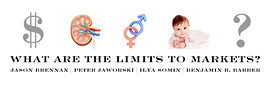After reading Benjamin Barber’s careful, fair, charitable, and rigorous essay, I realized Barber is right. Market fundamentalism and libertarianism are cuckoo. We ought to replace our apparent “monolithic monism” with, I suppose, polylithic pluralism. And I’d better start taking seriously the dialectical essence of politics. To that end, I’ve asked Oxford University Press to retract my book Libertarianism, and for Princeton University Press to retract The Ethics of Voting and the forthcoming Against Politics (a book that Barber would truly hate).
The thing is, even if Barber were right about all this – that market fundamentalism is dumb and bad, that markets need the state to be free, that social democracy is the best system, that the public sector is vital for ensuring our freedom and equality, or whatnot – it has no bearing on our argument in Markets without Limits.
The debate about commodification (which Barber’s book Consumed is to some degree about) is not a debate about whether markets should be free, whether libertarianism is true, or whether we need strong democratic oversight and control over the market. Is instead a debate about what sorts of things may properly be for sale. The thesis of Markets without Limits is not that we ought to have free markets in everything, democracy and justice be damned. It’s instead that anything you may do for free, you may permissibly do for money. There are limits to how we sell, but not what we sell, except the trivial and boring limit that you shouldn’t sell some things you shouldn’t have or do, period.
In fact, libertarians can reject everything in our book, and hard left social democrats can accept everything we say.
The question of whether it is morally permissible to have a market in some good or service is not the same as the question of whether it’s permissible to have a free, completely unregulated market in that good or service. Our thesis is that there are no inherent limits to what can be bought and sold. But that’s compatible with thinking that some things, or even all things, should only be bought and sold in highly regulated markets. The question of whether or not markets should be free and unregulated is a red herring in the anti-commodification debate.
To illustrate, notice that the following two positions are coherent:
- Anti-Commodification Libertarianism: G. A. Rothbard, the genetically engineered child of Marxist G. A. Cohen and libertarian Murray Rothbard, thinks markets are bad, and that we should never buy or sell anything. He opposes all commodification, even of mundane items, such as political theory books. However, G. A. Rothbard also believes that people have absolute negative rights against being interfered with when they buy and sell goods. Just as our rights of free speech allow us to say things that are wrong to say, he thinks we have rights to buy and sell even though doing so is always immoral. Thus, G. A. Rothbard thinks justice prohibits any coercive regulation of the market, but also thinks nothing should be for sale.
- Pro–Commodification Regulationism: Jason Barber, the genetically engineered child of Jason Brennan and Benjamin Barber, believes that everything you may do for free you may do for money, but only inside heavily regulated markets, under strong democratic oversight, in the background of a socially just social democracy.
Only in one paragraph does Barber respond to our actual book, but unfortunately, he just pounds the table and asserts that some markets are essentially exploitative – that it’s impossible for those markets not to involve wrongful exploitation. For instance, he asserts it’s impossible for one to sell surrogacy services without exploiting someone. We’d like to ask him to give us an argument about why that’s the case, rather than just assert it. Sure, some such markets involve exploitation, but I can’t see how, say, my friends Ben and Jason, who are paying their happy, healthy, not-at-all desperate upper-middle class friend to carry a baby for them, are exploiting her. But if Barber can show me otherwise, I’ll send Ben and Jason a letter of censure.

